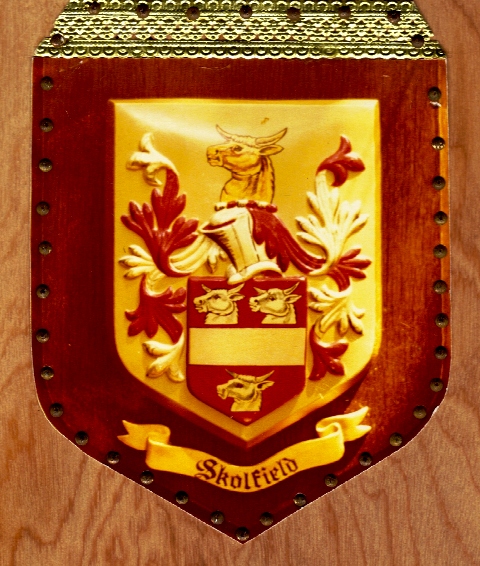Our Scofield family heritage can be traced back 400 years in America to the birth of our country, and another 300 years in England to the middle ages in England.
However, the Scofield name is most likely Nordic in origin from skali and feld - meaning "dweller by a field with a hut."
 |
| Scofield Family Crest |
Scofield/Schofield is a common surname, especially in Lancashire, England where today there are an estimated 8000 Scofield families.
The predominant theory is the Scofields came to England during the migration following the Norman conquest of England in 1066. After the Conquest, Normans, Frenchmen and Bretons from other parts of France settled in England. Early records mention John de Scolefeld who was recorded in the year 1343 in Lancashire and Edward Scholfield recorded in 1343 in Wakefield, Yorkshire. William Scoffield of County Lancashire, was documented during the reign of Edward III (1327-1377).
The Scofield name is thought to have originated in Escoville, Normandy, a small village near Caen, France. Several sources indicate the Schofield family was granted lands in Lancashire by Duke William of Normandy for their assistance at the Battle of Hastings in 1066. I haven't found actual documentation, instead, it may be a logical assumption based on the origin of the name as well as records, beginning in 1300s, documenting the Scofield family of Kent as landholders in Lancashire.
A similar theory is the Scofields descended from Sir Esbern de Cillesfelle, a Norman Knight who came to England with the invading armies of Duke William in 1066. Sir Esbern's name appears in the "Domesday " Book of Kent. Yet, this reference lacks evidence that the Scofields descended from De Cillesfelle. In fact, De Cillesfelle is translated in English to Chelsfield, "open field." Chesfield is an English Village aproximately 240 miles south of Rochdale, the home of the Scofield Hall. It appears more likely that Sir Esbern de Cillesfelle established the village of Chelsfield, but is not an ancestor of the Scofield family.
The Scofields indeed may have descended from the Normans who came to England in the 11th century gaining land and titles from the Duke of Normandy. It is also possible that they simply took the name Scofield from their land, "Dweller by a field with a hut." The Norman invasion is said to have transformed England's culture, language, politics and way of life.
If the Scofields did descend from the village of Escoville, Normandy France, what does that mean for our heritage, considering the Normans conquered northern France about 100 years prior to the English, conquest....
Escoville is a tiny village in northern France with little documented history. The nearby city of Caen, is actually known as "The City of William the Conquerer," for the buildings erected during his reign, including Château de Caen, one of the largest medieval fortresses, circa 1060, but also because William is buried in the city. The first mentions of the name of Caen are found in acts of the dukes of Normandy inferring that the Normans may have built the city. Certainly the Normans had great influence in the area, still there is no way to ascertain if a person emigrating from Escoville descended from French or Normans. In either case, the Normans, and Vikings before them, were, by nature, conquerers who migrated and assimilated with many cultures.
Spelling variations of the name include: Scofield, Skofield, Schofield, Scholefied, Schofelde, Scofielde, Scholefelde, Scholfield, Scofelte. Old and middle english did not have definitive spelling rules, thus it was not uncommon for one person to use different spellings within their lifetime. In fact, our ancestor Richard Scofield is listed on the immigration ship to America in 1633 as "Richard Skofield," but in American records he used "Scofield."








